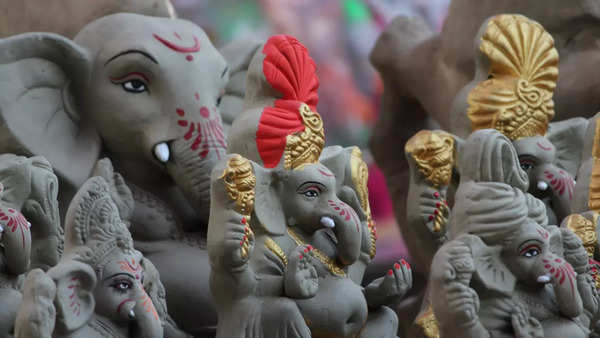ALSO READ: Ganesh Chaturthi 2021: 5 foods that Lord Ganesha loves
The significance of Ganesha idols during this tradition has led people to embrace eco-friendly alternatives. Creating eco-friendly Ganesha idols at home is not just a responsible choice but also a creative and fulfilling endeavour. Here are some popular choices for crafting Ganesha idols at home:
Clay or Terracotta
Clay or terracotta is one of the most eco-friendly materials for crafting Ganesha idols. It is readily available, biodegradable, and can be molded into intricate designs. To create your clay Ganesha idol, you can purchase clay from a local pottery store or gather it from your garden. Shape the idol using water and your creative skills. After the festival, you can immerse the idol in a bucket of water, and the clay will naturally dissolve without harming the environment.
Paper Mache
Paper Mache is another sustainable option for crafting Ganesha idols. To make a paper Mache idol, create a paste by mixing water, glue, and old newspaper strips. Build up the idol’s shape layer by layer, allowing each layer to dry before adding the next. Once the idol is complete, you can paint it using eco-friendly colors. After the festival, you can recycle or compost the paper Mache idol.
Coconut Husk
Crafting an idol from dried coconut husk is a unique and eco-friendly choice. You can carve a beautiful idol, adding details with natural colors like turmeric and vermilion. This approach not only repurposes a byproduct of the coconut but also provides a distinct texture to your idol.
Shadu Clay
Shadu clay, a type of natural clay, is traditionally used in Maharashtra for making eco-friendly Ganesha idols. It’s a smooth and easy-to-work-with material that can be molded into intricate designs. Shadu clay idols can be immersed in a bucket of water after the festival, allowing them to dissolve naturally.
Wheat Dough
For a creative and edible twist, consider making a Ganesha idol from wheat dough. This is a fun activity that you can involve your family in. Shape the idol using wheat dough, add edible colors and decorations, and share it with friends and family. After the festival, the idol can be immersed in water or used as bird feed.
Plantable Ganesha Idols
For a truly eco-friendly approach, create a Ganesha idol with a mixture of clay and seeds. After the festival, instead of immersing the idol in water, plant it in your garden or a pot. As it disintegrates, it will nourish the soil and grow into plants or flowers.

Edible Ganesha
The most eco-friendly option is to make an edible Ganesha using vegetables or chocolate. For the Visarjan, immerse the chocolate idol in milk and use it to make sweets that can be distributed to the poor or those in need. Similarly, with vegetables, on the day of Visarjan, immerse the Ganesha idol in water and use the veggies for distribution to those in need.
Tips for making eco-friendly Ganesha idol at home
When decorating your homemade eco-friendly Ganesha idol, opt for natural colours like turmeric, vermilion, rice flour, and vegetable dyes. These colors are non-toxic and biodegradable, ensuring they won’t harm the environment.
Crafting eco-friendly Ganesha idols at home not only honors tradition but also demonstrates a commitment to environmental conservation. It’s a wonderful way to connect with your creative side while making a positive impact on the planet. So, this Ganesh Chaturthi, consider choosing one of these eco-friendly materials and methods to create your own beautiful and sustainable Ganesha idol. It’s a step towards a greener and more responsible celebration of this cherished festival.
(Images courtesy: Canva)
